Welcome
to the Bell town of Gescher
Gescher, together with its southern district of Hochmoor, has a population of around 17,000 (as of mid-2019). The town looks back on more than a thousand years of history. Formerly a modest street village, it has undergone many changes, especially during the last 150 years. The village began to grow strongly from the start of industrialisation. In 1969 it received its town charter after incorporating the surrounding communities of Harwick, Tungerloh-Capellen, Pröbsting as well as Estern and Büren. Numerous buildings, neighbourhoods as well as green spaces have been transformed over the years, sometimes more than once. Traces of this are still reflected by today’s townscape.
Two trails - one project
Come along and feel free to explore Gescher’s History Trail and Planet Trail. The 6-km circular route is marked by signs and runs from Haus Hall through the centre of town and the park up to the north-eastern greenbelt in Berkelaue.
Gescher History Trail
The History Trail consists of 15 stations in Gescher and Hochmoor, all strikingly designed. Each station has three boards with texts and pictures on the town’s history and its natural environment. Each station is located at a point of interest in the urban space.
Here the town's history is brought to life by accounts of its textile industry, bell-founding, urban development, distinctive buildings and social life. Locals and visitors alike can learn interesting facts and key aspects of the town's history. Important data and stories about individual persons and events in the context of the town's history give a vivid impression of Gescher and its natural environment, which is dominated by the river Berkel.
GescherPlanetary Trail
Why not take a journey through our solar system, right here in Gescher? The eleven stations on the Planetary Trail are a model of our solar system on a scale of 1:1 billion. The trail starts just 400 metres east of Station A 1 and joins the History Trail at Bahnhofstrasse. Visit the “Sun” Station on the grounds of House Hall to find out more.

Ortskern um 1930

Glockenguss seit 1690

Stadtkern 2020

Hauptstraße um 1930

Gründerzeitvillen im Zentrum

Parkanlage „Berkeltal“

Textilindustrie seit 1862

Fabrikantenvilla

Kuhlenvenn im Ortsteil Hochmoor
HAUS HALL BEFORE 1945
From gentry estate to church foundation
Haus Hall has its origins in the Middle Ages and was first mentioned in 1390. The small aristocratic residence was bequeathed, auctioned and sold several times. Among its owners were a judge, a bailiff, a manufacturer, a cavalry captain, a judge and finally the prioress of Borghorst, Franziska von Schilder. She provided shelter for the priest Johann Josef Laprevote and his siblings Karl and Dominika in 1794 after they had fled the turmoil of the French Revolution. In 1812 Franziska bequeathed him her seat of nobility. Johann was survived by his brother Karl, who gave Haus Hall to the church in 1837 as a vicarage. In 1855, Bishop Johann Georg of Muenster established the Haus Hall Foundation as an "educational institution for neglected boys of Catholic denomination", as he stated in the original deed.
Haus Hall back then - a world of its own
75 years later, in 1930, the Foundation was given a new purpose, namely to care for people with special needs. 134 boys and 70 girls lived there at the end of 1931. Sitting amidst fields and gardens, Haus Hall was quite a distance away from the small town of Gescher. Its occupants lived together in large groups in rather confined spaces. About 40 nuns and monks provided care. Back then, Haus Hall was self-sufficient, farming its land and running its own bakery, tailor shop and other trades. There was hardly any contact with Gescher and its inhabitants. Surrounded by walls and fences, Haus Hall formed a world of its own. Its entrance gate, just behind the Berkel bridge, was firmly locked at the end of each day.
Effects of tyranny and war
Under Nazi dictatorship in Germany, many disabled people were subjected to forced sterilisation on the basis of the "Law for the Prevention of Hereditary Diseases". After 1939, the regime even classified severely disabled people as "unworthy of life". This was based on Hitler's secret decree and programme cynically called "euthanasia", meaning ‘merciful death’. Fortunatey, many residents of Haus Hall could be saved from this fate thanks to numerous committed, fearless individuals, including the then Bishop of Münster, Graf von Galen. However, during the war two girls and twenty-six boys who had lived in Haus Hall before 1939 fell victim to Hitler’s cruel ideology.
In 1944 and 1945 Haus Hall was turned into an auxiliary hospital for the Emscher-Lippe district. In 1944 more than 600 children were born in its maternity ward. Early in 1945, the hospital was converted into a military hospital. Over 1,300 war-injured patients, also from the surrounding areas, were cared for here in 1945. Then, on Christmas Eve 1945, almost 500 Germans expelled from the East arrived in Gescher and were accomodated at short notice in Haus Hall. Later on, many of them settled in Gescher and Hochmoor.

Der Innenhof um 1940

Die Pforte um 1940
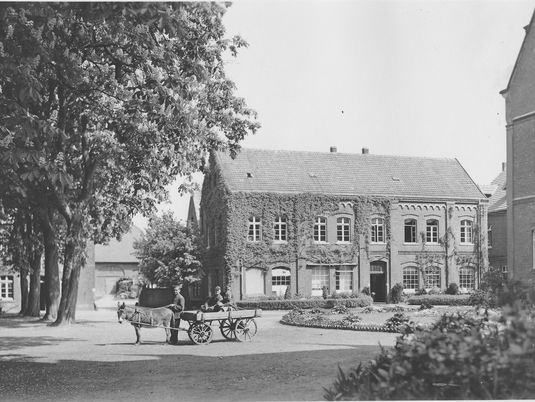
Das Handwerkerhaus um 1945

Der Kirchenraum um 1900

Ein Gruppenschlafraum

Die Gesamtanlage um 1940

Die Kapelle und das Vincenzhaus

Selbstversorgung durch Garten…

…und Feld

Der sogenannte „Heldenfriedhof“
Haus Hall after 1945
Re-start in a constitutional state – people with special needs are protected and involved
Article 1 of the German Constitution: "Human dignity is inviolable. Respecting and protecting it is the duty of all state authority." In 1994, Article 3 was added: "No one shall be discriminated against on account of their disability".
"Our society, which is fundamentally geared to performance and competition, is intact only if it grants full respect, full community and a maximum degree of integration to special needs minorities", declared Gustav Heinemann, German’s Federal President from 1969 to 1974.
Changes due to openness and encounter
At the end of 1949, 190 boys and 184 girls lived in Haus Hall and were looked after by 46 nuns and monks and a staff of 34. Over the years, the number of residents has risen to over 500, with more and more qualified employees tackling the tasks and responsibilities of the place and the number of staff from the religious order constantly declining. The last nuns left Haus Hall on 31.10.1967 and the vicariate was abolished.
From the 1960s onwards Haus Hall began to form connections with Gescher as a community. The walls and fences were removed so that people with special needs could be where they belong, i.e. not on the edge, but in the centre of society where everyday personal encounters are possible. New ideas and concepts for their accommodation, care and support has helped end the closed accommodation in dormitories. Now, most members of a group have their own room. In 1972, the first residents of Haus Hall moved to sheltered, external flats in Gescher. This concept continues today throughout the region.
In 1968 the "School for the Mentally Handicapped" became a special state school. In 1976, the "Workshops for People with Special Needs" was recognised by the state. Haus Hall is no longer fully self-sufficient, but also carries out commissioned work.
All this has changed Haus Hall in a fundamental way; numerous conversions and new buildings have been constructed on the foundation's park-like grounds, which cover around 41 hectares, over the years. Today there are living quarters, workshops, a combined heating and power plant, canteen kitchen, special school, integrative day care centre for children, care home, specialist services, the chapel, the administration and the cemetery. All that is left of farming is the nursery and a few animal enclosures. There is also a small residential area for families associated with Haus Hall.
Haus Hall today – connected with Gescher and the region
Haus Hall Foundation operates several facilities and services for people with special needs and senior citizens in western Muensterland and the northern Ruhr area: "Foundation Haus Hall – Facilities and Services for People".
Today the Haus Hall foundation is one of the largest employers in Gescher, providing jobs for skilled staff from the entire region. Details and current data can be found on the Internet at www.haushall.de.

Schaubild Gesamtanlage 2020

Klassenraum um 1950

Moderner Schulbau um 1970
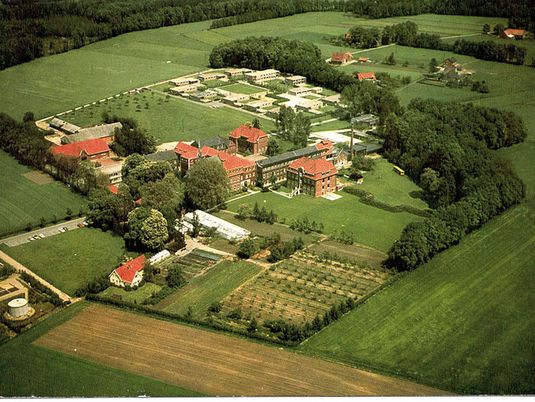
„Externe“ Wohngruppen um 1965

Neue Wohnkonzepte ab 1985

Seniorenwohnanlage seit 2014

Die „Pforte“ heute
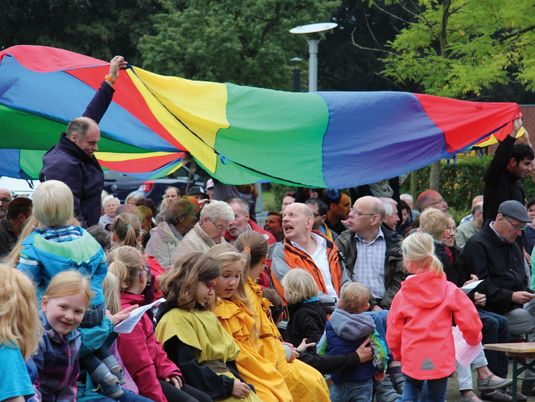
Sommerfest mit Gästen
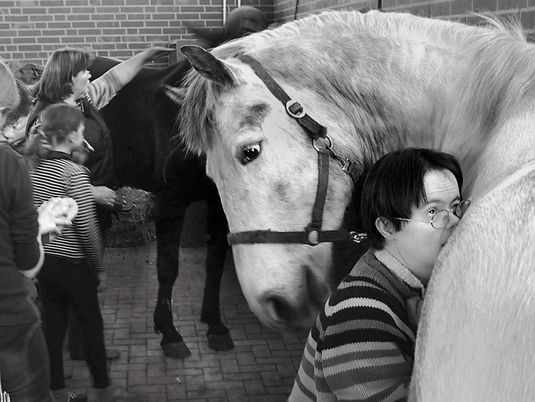
Therapiepartner Tier
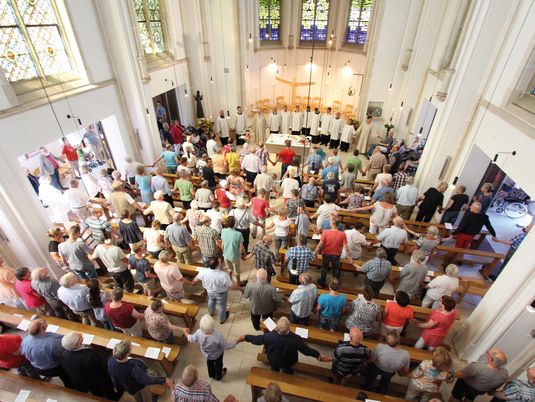
Gottesdienst mit Gästen